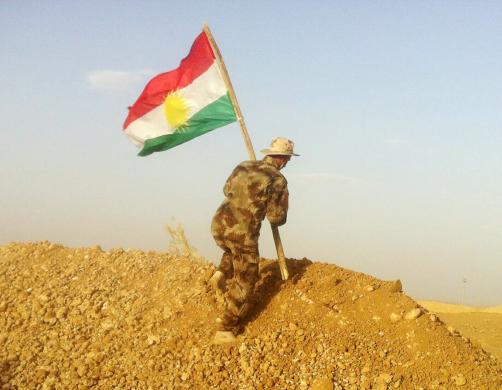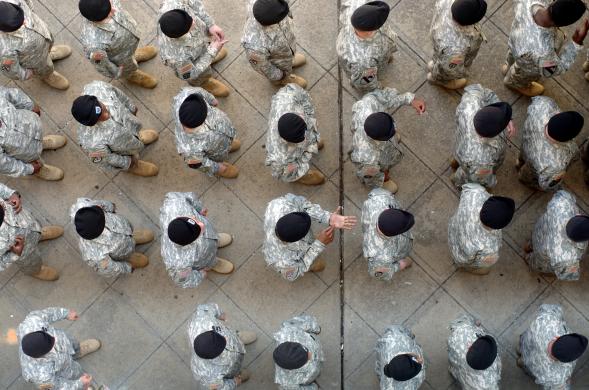Drawing Lessons from Stabilization Operations in the MENA Region
BY: SASKIA VAN GENUGTEN
Politicians and commentators commonly mention the need for “stability” and “stabilization” when referring to the current situation in the broader Middle East and North Africa (MENA). For the policy community concerned with Afghanistan and Iraq, this has been true for over a decade. Now, key international actors, regional players and local constituencies alike are similarly consumed with the question of how to put an end to the years of revolutionary uncertainty, upheaval and conflicts in several countries in the region—sparked by the 2011 Arab uprisings and exacerbated by domestic infighting and foreign meddling.
Indeed, most pundits agree that stabilization is what the broader MENA region desperately needs. Policymakers seem willing to work towards that goal of stability. But at the same time, a lack of consensus around what stability entails and how to get there keeps fueling instability instead.
When assessing international actors’ ideas concerning the meaning of “stability” and the process of “stabilization,” it generally is agreed that stability can be understood as an environment that is reasonably predictable and non-violent, while stabilization is a process that entails the blending of military means with other tools of statecraft and foreign policy. It brings together different, overlapping and interacting policy dimensions, which in institutionalized settings often is referred to as a “whole of government” or comprehensive approach.
Starting with the international reaction to the Balkan Wars of the 1990s, experiments with blending military, political, economic, humanitarian and developmental tools—as well as elements of transitional justice and reconciliation—became the norm. In the past decade, Afghanistan has served as the most important litmus test for this approach. But unfortunately, for all the tryouts in Kosovo, Afghanistan, Iraq, Libya and elsewhere, the stated ambitions versus realities on the ground have remained far apart and the few success stories, such as in Iraq’s Anbar province, short-lived.
The problem is that beyond the common, basic understanding of the two buzzwords, ideas differ regarding which non-military policy instruments should be part of the stabilization tool box, which instruments are priority, what the priorities are and whether a specific sequencing is appropriate. This already holds true when comparing approaches to stabilization within the West, and even within the different policy communities of a specific country. Military actors, for example, come to the table with different professional cultures and priorities from those working on the humanitarian and development aspects of stabilization.
Most importantly, with an increasing number of external actors, ideas about what the end state should be and what acceptable forms of stability are also have started to differ. Indeed, the number of voices and ideas increases significantly when actors from other parts of the world are equally involved with “stabilization operations.” The West might have an ideal society in mind while others, including Russia and the Gulf countries, have their own vision, reflecting what they believe makes for a stable situation.
Current developments in the MENA region, where the West is no longer the only cook in the kitchen, are shaped by this mismatch of explicit and implicit objectives and the differentiation in views regarding acceptable paths towards stability. Reflecting on recent experiences of stabilization efforts in the MENA region, Western policymakers can learn several lessons, including:
- Democratization does not necessarily increase stability in the region. For Europe and the U.S.—the two dominant forces of stabilization efforts in the broader MENA region until several years ago—the envisioned end state tends to be one of increased democracy and liberal market economic practices. Initially, the ideas were derived from democratic peace theories in vogue in the 1990s, which argued that democratization and open markets would lead to more sustainable forms of peace. While potentially true in the long-run, in the short-term, political elections in conflict and transitional situations are likely to spark more violence and civil wars. The MENA region has been a case in point, with Libya and Iraq being prime illustrations.
- Stabilization takes time and aftercare, with change needing to happen at many levels. Removing an undesired regime or throwing money at development projects, does not miraculously create a more stable and secure political environment. Corruption, radicalization and imperfect information play their respective roles and are difficult to tackle, with long-term root causes such as population growth, adverse effects of climate change and low oil prices compounding the precarious situation. While President Trump’s recent line on Afghanistan might sound appealingly simple (“killing terrorists” instead of focusing on nation-building), it is unlikely to be a winning strategy.
- Europeans and Americans are no longer the only kids on the block. In recent years, many other actors have become actively involved in the MENA region. As they come in with different histories and different economic and political systems, their views on what stability should look like and the preferred path toward stabilization, also differ. New powers including Turkey, Qatar, the UAE and Saudi Arabia, are increasing their presence, while a resurgent Russia is trying to assert itself in the region. Competition between the permanent members of the UN Security Council illustrates this change. And in contrast to the West, these new powers do not yet suffer from “intervention fatigue” or squeezed defense budgets.
Renowned pundit Dominique Moisi, in a recent article, states the following:
Today, too, mainly European, or Western, approaches to ensuring stability in the Middle East no longer work. As a top European diplomat told me recently, the Middle East crisis is in desperate need of fresh thinking and new leadership.
Moisi makes a very important point: the first step Western policymakers need to take is to reevaluate their own thinking, reflect on their own definitions of stability and stabilization of the MENA region, as well as on how these might differ from—and, in particular, how these interact with—other important international approaches to stabilization in the region.
Only by thoroughly understanding the world views, objectives and approaches of other external (and domestic) actors involved, as well as by appreciating the changing balance of powers between these key external actors, can the West expect to promote its own “ideal” in the Middle East’s increasingly crowded marketplace of ideas.
Saskia van Genugten is Senior Research Fellow at the Emirates Diplomatic Academy and co-director of the Academy’s “Stabilization Research Initiative.”
The views expressed in this post reflect those of the author and not that of the EastWest Institute.
Photo credit: "Flag of Egypt all over Tahrir Square" (CC BY 2.0) by RamyRaoof


 BNR: You say Iraq needs billions to reconstruct liberated areas. Some say Iraq perhaps needs 90 billion USD for reconstruction. Furthermore Iraq is considered one of the most corrupt countries in the world. Also the Kurds want to hold an independence referendum on Sept 25. Taken together this is a very complicated cocktail, isn't it?
BNR: You say Iraq needs billions to reconstruct liberated areas. Some say Iraq perhaps needs 90 billion USD for reconstruction. Furthermore Iraq is considered one of the most corrupt countries in the world. Also the Kurds want to hold an independence referendum on Sept 25. Taken together this is a very complicated cocktail, isn't it? 